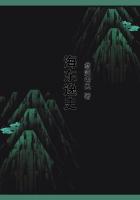They are in fancy alone on the river-bank, only the round moon above them and their linked shadows faintly fluttering in the stream. They have drawn so closely together now that her arm is encircling his neck, her soft eyes uplifted like the moon's reflection and drowning into his; closer and closer till their hearts stop beating and their lips have met in a first kiss.
Faster, O little feet! swing clear, O Cressy's skirt and keep the narrowing circle back! . . . They are again alone; the judges' dais and the emblazoning of the State caught in a single whirling flash of consciousness are changed to an altar, seen dimly through the bridal veil that covers her fair head. There is the murmur of voices mingling two lives in one. They turn and pass proudly down between the aisles of wondering festal faces. Ah! the circle is drawing closer. One more quick whirl to keep them back, O flying skirt and dainty-winged feet! Too late! The music stops. The tawdry walls shut in again, the vulgar crowds return, they stand pale and quiet, the centre of a ring of breathless admiring, frightened, or forbidding faces. Her arms fold like wings at her side. The waltz is over.
A shrill feminine chorus assail her with praises, struck here and there with a metallic ring of envy; a dozen all-daring cavaliers, made reckless by her grace and beauty, clamor for her hand in the next waltz. She replies, not to them, but to him, "Not again," and slips away in the crowd with that strange new shyness that of all her transformations seems the most delicious. Yet so conscious are they of their mutual passion that they do not miss each other, and he turns away as if their next meeting were already an appointed tryst. A few congratulate him on his skill. Johnny's paragon looks after him curiously; certain elders shake hands with him perplexedly, as if not quite sure of the professional consistency of his performance. Those charming tide-waiters on social success, the fair, artfully mingling expectation with compliment, only extract from him the laughing statement that this one waltz was the single exception allowed him from the rule of his professional conduct, and he refers them to his elder critics. A single face, loutish, looming, and vindictive, stands on among the crowd--the face of Seth Davis. He had not seen him since he left the school; he had forgotten his existence; even now he only remembered his successor, Joe Masters, and he looked curiously around to see if that later suitor of Cressy's was present. It was not until he reached the door that he began to think seriously of Seth Davis's jealous face, and was roused to a singular indignation. "Why hadn't this great fool vented his jealousy on the openly compromising Masters," he thought. He even turned and walked back with some vaguely aggressive instinct, but the young man had disappeared. With this incident still in his mind he came upon Uncle Ben and Hiram McKinstry standing among the spectators in the doorway. Why might not Uncle Ben be jealous too? and if his single waltz had really appeared so compromising why should not Cressy's father object? But both men--albeit, McKinstry usually exhibited a vague unreasoning contempt for Uncle Ben--were unanimous in their congratulations and outspoken admiration.
"When I see'd you sail in, Mr. Ford," said Uncle Ben, with abstract reflectiveness, "I sez to the fellers, 'lie low, boys, and you'll see style.' And when you put on them first steps, I sez, 'that's French--the latest high-toned French style--outer the best masters, and--and outer the best books. For why?' sez I. 'It's the same long, sliding stroke you see in his copies. There's that long up sweep, and that easy curve to the right with no hitch. That's the sorter swing he hez in readin' po'try too. That's why it's called the po'try of motion,' sez I. 'And you ken bet your boots, boys, it's all in the trainin' o' education.'"
"Mr. Ford," said Mr. McKinstry gravely, slightly waving a lavender-colored kid glove, with which he had elected to conceal his maimed hand, and at the same moment indicate a festal occasion: "I hev to thank ye for the way you took out that child o' mine, like ez she woz an ontried filly, and put her through her paces. I don't dance myself, partikly in that gait--which I take to be suthin' betwixt a lope and a canter and I don't get to see much dancin' nowadays on account o' bein' worrited by stock, but seein' you two together just now, suthin' came over me, and I don't think I ever felt so kam in my life."
The blood rushed to the master's cheek with an unexpected consciousness of guilt and shame. "But," he stammered awkwardly, "your daughter dances beautifully herself; she has certainly had practice."
"That," said McKinstry, laying his gloved hand impressively on the master's shoulder, with the empty little finger still more emphasized by being turned backward in the net; "that may be ez it ez, but I wanted to say that it was the ******, easy, fammily touch that you gev it, that took me. Toward the end, when you kinder gathered her up and she sorter dropped her head into your breast-pocket, and seemed to go to sleep, like ez ef she was still a little girl, it so reminded me of the times when I used to tote her myself walkin' by the waggin at Platt River, that it made me wish the old woman was here to see it."
Still coloring, the master cast a rapid, sidelong glance at McKinstry's dark red face and beard, but in the slow satisfaction of his features there was no trace of that irony which the master's self-consciousness knew.
"Then your wife is not here?" said Mr. Ford abstractedly.
"She war at church. She reckoned that I'd do to look arter Cressy--she bein', so to speak, under conviction. D'ye mind walkin' this way a bit; I want to speak a word with ye?" He put his maimed hand through the master's arm, after his former fashion, and led him to a corner.
"Did ye happen to see Seth Davis about yer?"
"I believe I saw him a moment ago," returned Mr. Ford half contemptuously.
"Did he get off anythin' rough on ye?"















